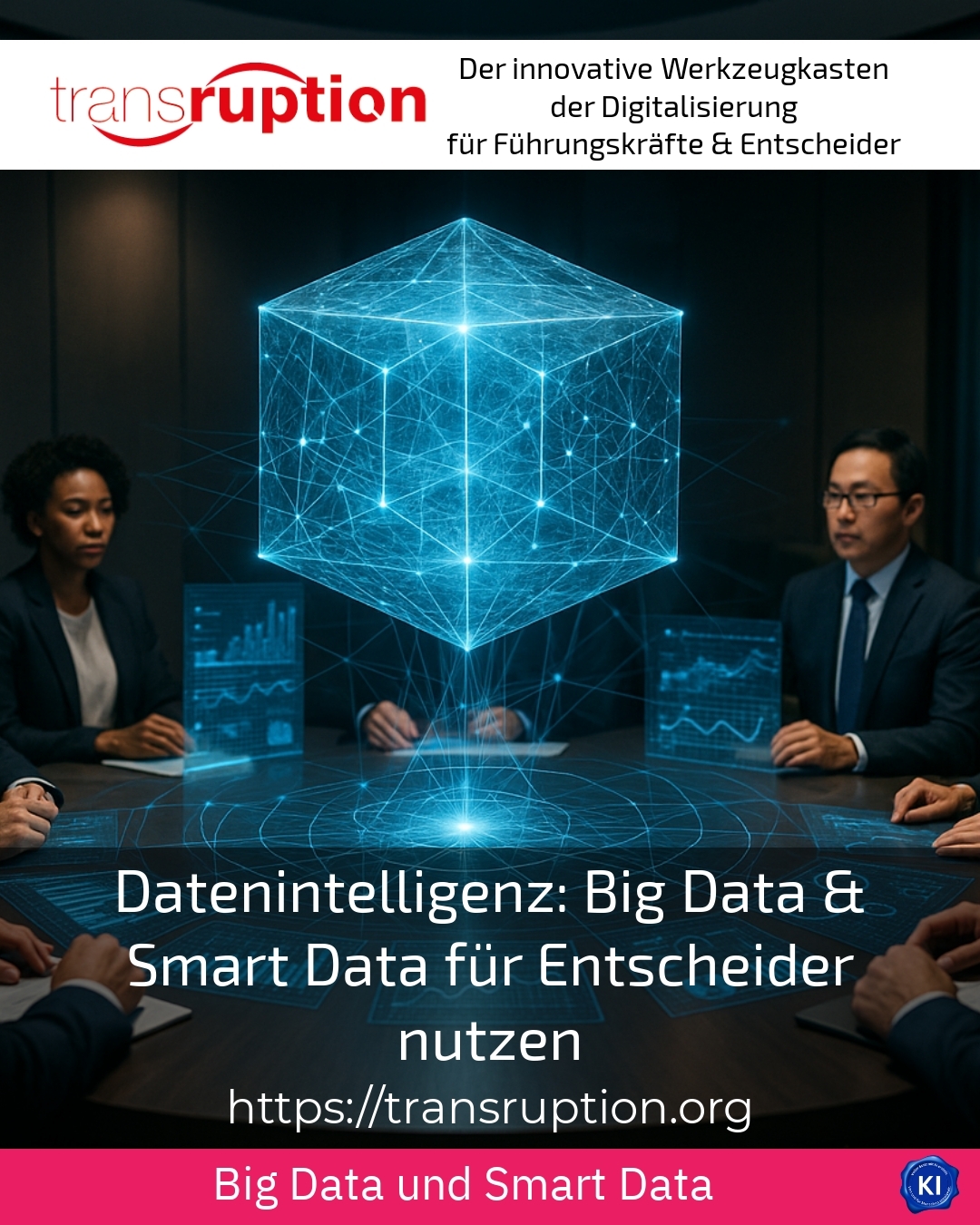In the digital age, the ability to derive real benefit from vast amounts of information is crucial. This ability is known as data intelligence. Today, companies are faced with the challenge of generating precise, relevant and high-quality data sets, i.e. smart data, from a variety of raw data, so-called big data. This is the only way to make well-founded decisions, optimise processes and secure competitive advantages.
Data intelligence: From big data as a raw material to smart data
Big data describes the enormous amount of different data that companies generate every day. For example, retailers collect sales figures, banks record customer transactions and industry analyses sensor data from machines. This data is often unstructured, complex and difficult to analyse. Initially, it is more like a raw material that first needs to be processed.
This is where data intelligence comes in: it transforms the disorganised flood of data into smart data. This intelligent data is filtered, quality-checked and contextualised so that it provides immediately usable information. A logistics company can use the smart data to dynamically optimise routes and reduce delivery times, for example, while a manufacturer can use sensitive maintenance data to detect and avoid machine failures at an early stage.
Many companies report that although big data alone sounds impressive, only smart data really creates added value. It is therefore important to focus on data intelligence and not just on the sheer volume of data.
How data intelligence effectively supports decision-makers
The central task of data intelligence is to provide management decision-makers with clear, reliable findings. This allows risks to be better assessed, opportunities to be recognised more quickly and strategies to be designed based on data. For example, an insurer can use smart data to analyse claims and thus adapt new tariffs and products more precisely to customer needs.
Data intelligence is also leading to innovative applications in the healthcare sector: Clinics are analysing patient data in order to optimise treatment processes and use resources more efficiently. At the same time, patients benefit from individualised therapies through the use of smart data.
Retail, industry and telecommunications are other areas in which data intelligence serves as a strong companion in complex decision-making processes. It ensures that only the truly relevant information comes into focus, thus creating a solid foundation for sustainable success.
Best practice in customer projects
BEST PRACTICE at the customer (name hidden due to NDA contract) A medium-sized production company was able to significantly increase the efficiency of its production line by using data intelligence. The intelligent analysis of machine data resulted in a digital monitoring system that recognises maintenance requirements at an early stage. This led to less downtime and higher quality standards.
BEST PRACTICE at the customer (name hidden due to NDA contract) A retailer used smart data to consolidate customer data from various channels. This enabled the marketing team to achieve better segmentation and personalised offers, which strengthened customer loyalty and increased sales.
BEST PRACTICE at the customer (name hidden due to NDA contract) In the telecommunications sector, data intelligence helped to analyse network behaviour. This enabled bottlenecks to be recognised and resolved in real time, resulting in improved service quality and customer satisfaction.
Practical tips for implementing data intelligence
In order to successfully implement data intelligence, a few steps are important:
- Ensure data quality: Raw data must be carefully checked, cleansed and, if necessary, consolidated.
- Develop a robust data strategy: Define clear goals as to which questions should be answered and which processes should be optimised.
- Involve specialists: Data scientists and analysts who use algorithms and AI are required to turn big data into smart data.
- Integrate technology: Modern tools for data processing, visualisation and automation support the analysis process.
- Operationalise data-intelligent solutions: The insights gained must be incorporated into decision-making processes and operational workflows.
Companies often report that it is not enough just to collect data. Rather, it is important to interpret it in the right context and utilise it in a targeted manner. Data intelligence can therefore provide targeted impetus and serve as support for digital transformation and innovation projects.
The role of data intelligence in various industries
In the automotive industry, for example, data intelligence supports product development. Data from vehicles and users is analysed in order to make future models safer and more customer-oriented.
In retail, the intelligent evaluation of purchasing behaviour helps to identify trends and better manage marketing measures. This allows offline and online channels to be optimally networked.
In industry, smart data enables production processes to be monitored in real time. Errors are detected more quickly and resource utilisation is increased.
My analysis
Data intelligence is a valuable resource for companies that want to remain competitive in dynamic markets. The transition from pure data to smart, relevant information creates a solid basis for better decisions. Decision-makers benefit when they use less data but targeted insights to optimise processes, assess risks and promote growth. The journey from big data to smart data requires a smart strategy, suitable technologies and the human expertise to achieve sustainable benefits.
Further links from the text above:
[1] What is smart data - B2B smart data
[2] Smart data: definition, application and difference to big data - O2 Business Magazin
[3] Data intelligence - big data and smart data for decision-makers - Sauldie
[5] Unleashing data intelligence: Big Data & Smart Data for Decision Makers - Sauldie
[8] Big Data & Smart Data specifically for decision-makers - Sauldie
For more information and if you have any questions, please contact Contact us or read more blog posts on the topic TRANSRUPTION here.















